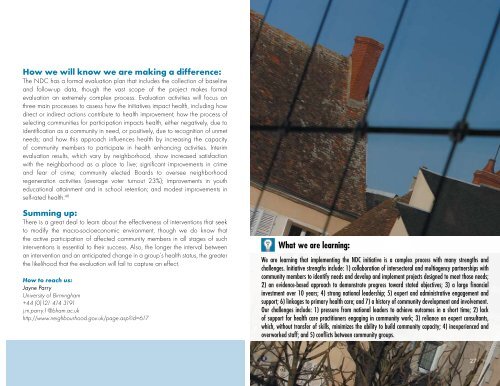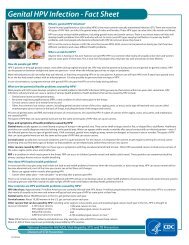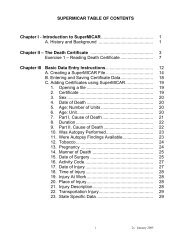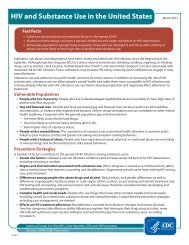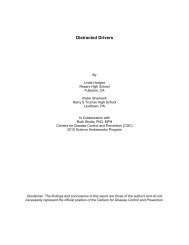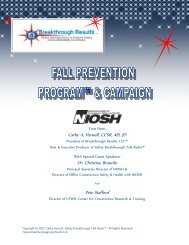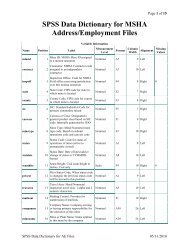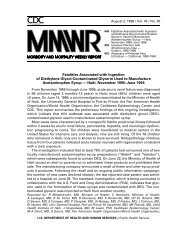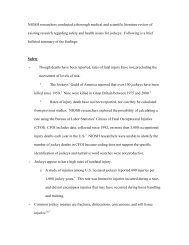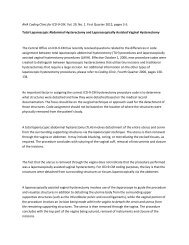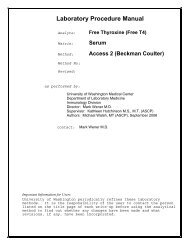Promoting Health Equity - A Resource to Help Communities Address ...
Promoting Health Equity - A Resource to Help Communities Address ...
Promoting Health Equity - A Resource to Help Communities Address ...
You also want an ePaper? Increase the reach of your titles
YUMPU automatically turns print PDFs into web optimized ePapers that Google loves.
How we will know we are making a difference:<br />
The NDC has a formal evaluation plan that includes the collection of baseline<br />
and follow-up data, though the vast scope of the project makes formal<br />
evaluation an extremely complex process. Evaluation activities will focus on<br />
three main processes <strong>to</strong> assess how the initiatives impact health, including how<br />
direct or indirect actions contribute <strong>to</strong> health improvement; how the process of<br />
selecting communities for participation impacts health, either negatively, due <strong>to</strong><br />
identifcation as a community in need, or positively, due <strong>to</strong> recognition of unmet<br />
needs; and how this approach infuences health by increasing the capacity<br />
of community members <strong>to</strong> participate in health enhancing activities. Interim<br />
evaluation results, which vary by neighborhood, show increased satisfaction<br />
with the neighborhood as a place <strong>to</strong> live; signifcant improvements in crime<br />
and fear of crime; community elected Boards <strong>to</strong> oversee neighborhood<br />
regeneration activities (average voter turnout 23%); improvements in youth<br />
educational attainment and in school retention; and modest improvements in<br />
self-rated health. 48<br />
Summing up:<br />
There is a great deal <strong>to</strong> learn about the effectiveness of interventions that seek<br />
<strong>to</strong> modify the macro-socioeconomic environment, though we do know that<br />
the active participation of affected community members in all stages of such<br />
interventions is essential <strong>to</strong> their success. Also, the longer the interval between<br />
an intervention and an anticipated change in a group’s health status, the greater<br />
the likelihood that the evaluation will fail <strong>to</strong> capture an effect.<br />
How <strong>to</strong> reach us:<br />
Jayne Parry<br />
University of Birmingham<br />
+44 (0)121 414 3191<br />
j.m.parry.1@bham.ac.uk<br />
http://www.neighbourhood.gov.uk/page.asp?id=617<br />
What we are learning:<br />
We are learning that implementing the NDC initiative is a complex process with many strengths and<br />
challenges. Initiative strengths include: 1) collaboration of intersec<strong>to</strong>ral and multiagency partnerships with<br />
community members <strong>to</strong> identify needs and develop and implement projects designed <strong>to</strong> meet those needs;<br />
2) an evidence-based approach <strong>to</strong> demonstrate progress <strong>to</strong>ward stated objectives; 3) a large fnancial<br />
investment over 10 years; 4) strong national leadership; 5) expert and administrative engagement and<br />
support; 6) linkages <strong>to</strong> primary health care; and 7) a his<strong>to</strong>ry of community development and involvement.<br />
Our challenges include: 1) pressure from national leaders <strong>to</strong> achieve outcomes in a short time; 2) lack<br />
of support for health care practitioners engaging in community work; 3) reliance on expert consultants,<br />
which, without transfer of skills, minimizes the ability <strong>to</strong> build community capacity; 4) inexperienced and<br />
overworked staff; and 5) conficts between community groups.<br />
27


